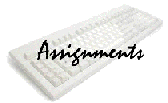From the UTEP History Tutoring Center: "The only effective way to read, is to re-read." The word "effective" here means being an active reader. This means that you shouldn't simply read the material without making any marks and underlining in your book(s). Don't think of the assignment as just another thing to read; think of it as a way of connecting with the material. Be creative when it comes to reading. Ask hypothetical questions that will help you create a scenario. This is what most professors refer to as "analytical thinking." History isn't just about names and places, it's also about HOW and WHY (the significance), and sometimes the WHAT IF?. It is important that you transform from being a passive reader, which some of you have been trained to be, and engage in active reading. Think for yourself and determine why the material your are reading is important. It is a good idea to underline key concepts and make both a mental and written note of any questions you might have. Make a point to find anything you can logically disagree with. More than likely, your professor will not penalize you for presenting a cogent counter-argument; just as long as you provide evidence from the material for your position.
"Contrary to popular belief, you will not get more money back at the end of a semester for returning a book that isn't marked up, or even for one that hasn't been read. History courses are primarily based on reading textbooks, as well as secondary sources, and sometimes primary sources. So the best thing to do for yourself, and ultimately your grade, is to READ, then re-READ, and finally, re-READ again."
|
OTHER
READING RESOURCES:
"A Crime Against Kansas" speech. (resource)
O.W. 7/08 for Fall, 2008.
|





